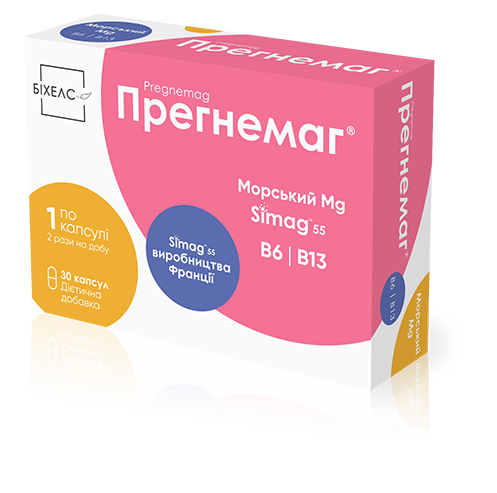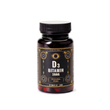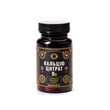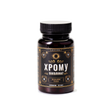* - percentage of daily requirement for women during pregnancy in vitamins and minerals.
Functional properties of the dietary supplement Pregnemag® are determined by the physiological activity of the biologically active substances that are part of its active ingredients.
Proper nutrition of the future mother plays an important role in the normal development of the fetus and the physiological course of pregnancy. The diet of pregnant women should be balanced in terms of macro- and micronutrients, considering the increasing need for them, which becomes more difficult to meet solely through food intake as the pregnancy progresses.
In this regard, the generally accepted approach to pre-conception preparation and pregnancy management involves nutrient support, which includes the preventive administration of various vitamin and mineral complexes. The need for their use is unquestionable among scientists and healthcare professionals. For example, magnesium is a mineral that is essential for maintaining normal human body function. During pregnancy, the need for magnesium significantly increases, and its deficiency not only causes discomfort but also increases the risk of complications and adverse obstetric and neonatal outcomes. Another biologically significant element is the B-group vitamins, which are critically important for the absorption of magnesium and are also necessary for the normal mental development of the unborn child.
Marine magnesium “Simag 55” from France, included in Pregnemag®, is a purified natural marine mineral extract. Its specific geographic origin provides a unique mineral profile. A gentle solvent-free process reduces the sodium and chloride content. Magnesium is an essential nutrient and acts as a factor influencing over 300 enzymes involved in the biological processes of fetal development.
Marine magnesium is an indispensable component of all enzymatic, ATP-dependent reactions; it participates in the metabolism of carbohydrates, proteins, and fats, as well as in redox reactions. Magnesium activates glycolytic enzymes, cellular oxidation enzymes, and nucleic acid synthesis enzymes; it also plays an important role in myocardial contraction processes. Magnesium stabilizes platelets and fibrinogen. The pathogenic role of magnesium deficiency in arterial hypertension, vascular spasms, neoplastic diseases, and urolithiasis is widely recognized. Magnesium plays a key role in neuromuscular excitation, where it acts as a calcium antagonist.
Magnesium stabilizes mitosis and meiosis processes, which ensures the formation of a genetically healthy embryo. Among human tissues, the placenta has one of the highest magnesium levels, owing to its high concentration of mitochondria, which are the center of energy metabolism, important for both the fetus and the mother.
The daily requirement for magnesium in women is 280-300 mg (mg), and during pregnancy and lactation, it increases by 20-30% – up to 340-355 mg (mg).
Pyridoxine hydrochloride (vitamin B6), included in Pregnemag®, is primarily involved in amino acid metabolism, as pyridoxal phosphate is part of the enzymes that catalyze decarboxylation and transamination, as well as carbohydrate and fat metabolism. It promotes the transport of amino acids across membranes, is necessary for the activation of phosphorylase, the formation of neurotransmitters, gamma-aminobutyric acid, glycine, and serotonin. It is involved in the metabolism of vitamin B12, folic acid, the synthesis of porphyrins, and unsaturated fatty acids. It activates metabolic processes in the myocardium, especially during hypoxia, and may have neurotropic, hematopoietic, cardiotropic, and hepatotropic properties. The mechanism of interaction between magnesium and vitamin B6 has not been precisely established. Symptoms of deficiency, as well as overdose, of both components are similar, but vitamin B6 deficiency symptoms are more pronounced in the presence of magnesium deficiency, as magnesium is necessary for the activation of pyridoxine-dependent enzyme systems. Vitamin B6 deficiency is often one of the causes of early toxicosis. For the fetus, vitamin B6 ensures the proper development of the brain and nervous system.
Orotic acid (vitamin B13), which is part of Pregnemag®, has a stimulating effect on protein metabolism (protein synthesis) and growth processes, and it has a beneficial effect on liver function. Orotic acid deficiency leads to impaired protein metabolism, methionine synthesis, folate metabolism, and pantothenic acid transformations. The ability of orotic acid to stimulate protein synthesis is used in the feeding of premature infants.
Recommendations for use: it is recommended to include in the diet as an additional source of biologically active substances to improve the general condition of women with a deficiency of magnesium and vitamins B6 and B13 during pregnancy, as well as a general tonic that positively affects the nervous system. It can also be recommended for individuals with chronic physical and mental fatigue, irritability, increased risk of stress, depression, and sleep disorders.
Not a medicinal product.
Method of use and recommended daily dose: for adults, take 1 capsule 2 times a day after meals. The capsules should be swallowed without chewing and washed down with sufficient drinking water.
Consultation with a doctor is recommended before use.
Duration of use: determined by the doctor individually, taking into account the nature and degree of vitamin and mineral deficiencies, the stability of the achieved effect, and sensitivity.
Application features: when using iron supplements simultaneously, the interval between taking Pregnemag® and these products should be 2-3 hours. Regular daily consumption may be important during pregnancy or breastfeeding, as the need for magnesium and B vitamins significantly increases during these periods.
Precautions: do not exceed the recommended daily dose. The dietary supplement should not be used as a substitute for a full-fledged diet.
Contraindications: hypersensitivity to any of the components, children under 12 years of age, glomerulonephritis or pyelonephritis in the acute stage.
Storage conditions: store in the original packaging at a temperature not exceeding 25°C in a dry, dark place, away from direct sunlight and out of the reach of children.
Form of release: indicated on the packaging.
Batch number (Batch No.) and expiration date (Use by): indicated on the packaging.
Manufacturer’s name and location, and phone number, as well as the address of the production facility: indicated on the packaging.
 Pregnemage
Pregnemage – Simag Sea Magnesium Complex
55 and vitamins B6 and B13< /span>
– it is a purified natural marine mineral extract. The specific geographical origin allows to obtain a unique mineral profile. A solvent-free process allows to reduce the content of sodium and chlorides in its composition. Magnesium is an essential nutrient and serves as a cofactor affecting more than 300 metabolic reactions in the body.

























